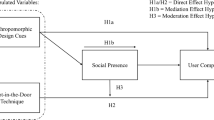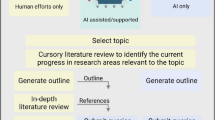Abstract
Recently, major software development platforms have started to provide automatic reviewer recommendation (ARR) services for pull requests to improve collaborative coding review process. However, the user experience of ARR is under-investigated. In this paper, we use a two-stage mixed-methods approach to study how software developers perceive and work with the Facebook mention bot, one of the most popular ARR bots in GitHub. Specifically, in Stage I, we conduct archival analysis on projects employing mention bot and a user survey to investigate bot performance. A year later, in Stage II, we revisit these projects and conduct additional surveys and interviews with three user groups: project owners, contributors and reviewers. Results show that developers appreciate mention bot saving their efforts, but are bothered by its unstable setting and unbalanced workload allocation. We conclude with design considerations for improving ARR services.





Similar content being viewed by others
References
Bacchelli, A., Bird, C.: Expectations, outcomes, and challenges of modern code review. In: Proceedings of the 2013 International Conference on Software Engineering, ICSE ’13, pp. 712–721. IEEE Press, Piscataway (2013). http://dl.acm.org/citation.cfm?id=2486788.2486882
Badampudi, D., Britto, R., Unterkalmsteiner, M.: Modern code reviews—preliminary results of a systematic mapping study. In: Proceedings of the Evaluation and Assessment on Software Engineering, EASE ’19, pp. 340–345. ACM, New York (2019). https://doi.org/10.1145/3319008.3319354
Balachandran, V.: Reducing human effort and improving quality in peer code reviews using automatic static analysis and reviewer recommendation. In: Proceedings of ICSE, pp. 931–940. IEEE Press (2013)
Chen, L., Wu, W., He, L.: How personality influences users’ needs for recommendation diversity? In: CHI ’13 Extended Abstracts on Human Factors in Computing Systems, CHI EA ’13, pp. 829–834. ACM, New York (2013). https://doi.org/10.1145/2468356.2468505
erlend sh: Only activate mention bot on prs without comments (2016). https://github.com/facebook/mention-bot/issues/119. Accessed 16 Sept 2016
Facebook: mention-bot (2015). https://github.com/facebookarchive/mention-bot. Accessed 23 May 2019
Fejzer, M., Przymus, P., Stencel, K.: Profile based recommendation of code reviewers. J. Intell. Inf. Syst. 50(3), 597–619 (2018). https://doi.org/10.1007/s10844-017-0484-1
Ferwerda, B., Yang, E., Schedl, M., Tkalcic, M.: Personality traits predict music taxonomy preferences. In: Proceedings of the 33rd Annual ACM Conference Extended Abstracts on Human Factors in Computing Systems, CHI EA ’15, pp. 2241–2246. ACM, New York (2015). https://doi.org/10.1145/2702613.2732754
GitHub: Understanding the github flow (2013). https://guides.github.com/introduction/flow/. Accessed 23 May 2019
GitHub: Github api v3 (2016). https://developer.github.com/v3/. Accessed 23 May 2019
GitHub: About code owners (2017a). https://help.github.com/articles/about-codeowners/. Accessed 23 May 2019
Github: request review in github (2017b). https://help.github.com/articles/requesting-a-pull-request-review/. Accessed 23 May 2019
Gousios, G., Pinzger, M., Deursen, A.V.: An exploratory study of the pull-based software development model. In: Proceedings of ICSE, pp. 345–355. ACM, New York (2014)
Gousios, G., Zaidman, A., Storey, M.A., Van Deursen, A.: Work practices and challenges in pull-based development: the integrator’s perspective. In: Proceedings of ICSE, pp. 358–368. IEEE Press (2015)
Gousios, G., Storey, M.A., Bacchelli, A.: Work practices and challenges in pull-based development: the contributor’s perspective. In: 2016 IEEE/ACM 38th International Conference on Software Engineering (ICSE), pp. 285–296 (2016a). https://doi.org/10.1145/2884781.2884826
Gousios, G., Storey, M.A., Bacchelli, A.: Work practices and challenges in pull-based development: the contributor’s perspective. In: Proceedings of ICSE, pp. 285–296. ACM, New York (2016b)
Hoaglin, D.C., Iglewicz, B., Tukey, J.W.: Performance of some resistant rules for outlier labeling. J. Am. Stat. Assoc. 81(396), 991–999 (1986)
Jiang, J., He, J.H., Chen, X.Y.: Coredevrec: automatic core member recommendation for contribution evaluation. J. Comput. Sci. Technol. 30(5), 998–1016 (2015)
Lee, M.K., Kusbit, D., Metsky, E., Dabbish, L.: Working with machines: the impact of algorithmic and data-driven management on human workers. In: Proceedings of the 33rd Annual ACM Conference on Human Factors in Computing Systems, CHI ’15, pp. 1603–1612. ACM, New York (2015). https://doi.org/10.1145/2702123.2702548
Pham, R., Singer, L., Liskin, O., Filho, F.F., Schneider, K.: Creating a shared understanding of testing culture on a social coding site. In: 2013 35th International Conference on Software Engineering (ICSE), pp. 112–121 (2013). https://doi.org/10.1109/ICSE.2013.6606557
Rahman, M.M., Roy, C.K., Collins, J.A.: Correct: Code reviewer recommendation in github based on cross-project and technology experience. In: 2016 IEEE/ACM 38th International Conference on Software Engineering Companion (ICSE-C), pp. 222–231 (2016)
Sinha, R., Swearingen, K.: The role of transparency in recommender systems. In: CHI ’02 Extended Abstracts on Human Factors in Computing Systems, CHI EA ’02, pp. 830–831. ACM, New York (2002). https://doi.org/10.1145/506443.506619
Stolze, M., Nart, F.: Well-integrated needs-oriented recommender components regarded as helpful. In: CHI ’04 Extended Abstracts on Human Factors in Computing Systems, CHI EA ’04, pp. 1571–1571. ACM, New York (2004). https://doi.org/10.1145/985921.986147
Thongtanunam, P., Tantithamthavorn, C., Kula, R.G., Yoshida, N., Iida, H., Matsumoto, K.i.: Who should review my code? a file location-based code-reviewer recommendation approach for modern code review. In: Proceedings of SANER, pp. 141–150. IEEE (2015)
Tsay, J., Dabbish, L., Herbsleb, J.: Influence of social and technical factors for evaluating contribution in github. In: Proceedings of ICSE, pp. 356–366. ACM, New York (2014)
Webhooks: webhooks (2017). https://developer.github.com/webhooks/. Accessed 01 Sept 2017
Xia, X., Lo, D., Wang, X., Yang, X.: Who should review this change?: putting text and file location analyses together for more accurate recommendations. In: Proceedings of ICSME, pp. 261–270. IEEE (2015)
Yu, Y., Wang, H., Filkov, V., Devanbu, P., Vasilescu, B.: Wait for it: determinants of pull request evaluation latency on github. In: Proceedings of MSR, pp. 367–371. IEEE (2015)
Yu, Y., Wang, H., Yin, G., Wang, T.: Reviewer recommendation for pull-requests in github: what can we learn from code review and bug assignment? Inf. Softw. Technol. 74, 204–218 (2016)
Zanjani, M., Kagdi, H., Bird, C.: Automatically recommending peer reviewers in modern code review. Trans. Softw. Eng. 42, 530–542 (2016)
Author information
Authors and Affiliations
Corresponding author
Rights and permissions
About this article
Cite this article
Peng, Z., Ma, X. Exploring how software developers work with mention bot in GitHub. CCF Trans. Pervasive Comp. Interact. 1, 190–203 (2019). https://doi.org/10.1007/s42486-019-00013-2
Received:
Accepted:
Published:
Issue Date:
DOI: https://doi.org/10.1007/s42486-019-00013-2




